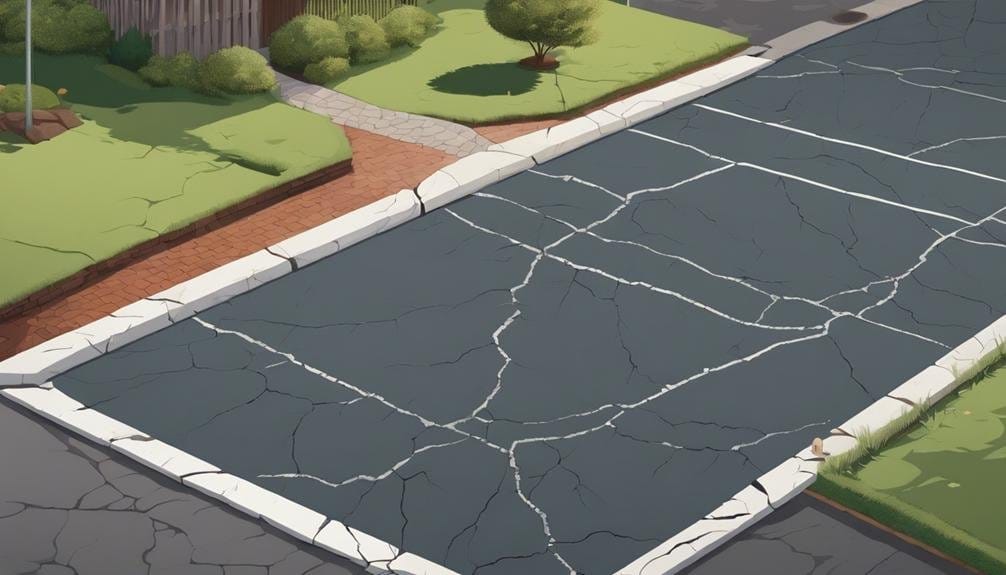When it comes to safeguarding your driveway, think of sealants as a shield against the elements, enhancing its durability and appearance.
But that’s just the beginning.
Discover the secrets to a well-protected driveway, ensuring its longevity and strength through simple yet crucial steps.
Key Takeaways
- Seal driveway every 2-5 years for longevity and protection
- Use mild detergent to clean before applying sealer
- Choose sealant with UV protection for durability
- Consider professional sealcoating for expertise and added benefits
Importance of Sealcoating for Driveways

Sealcoating your driveway significantly extends its lifespan by up to 30 years, providing essential protection against various elements such as heat, UV damage, water penetration, freeze/thaw cycles, and chemicals. This protective layer acts as a barrier, shielding the asphalt from deteriorating factors.
Water penetration, one of the main culprits for driveway damage, is effectively prevented by sealcoating, reducing the risk of aggregate breakup and cracks caused by moisture seeping into the asphalt. By sealing the surface, you aren’t only enhancing the durability of your driveway but also improving its aesthetic appeal.
Regular maintenance, which includes sealcoating, is crucial for ensuring the longevity and structural integrity of your driveway. Moreover, the value of your property increases with proper sealcoating, as it not only protects but also enhances the overall look of your driveway, making it a wise investment in the long run.
Benefits of Sealing Your Driveway
To maximize the benefits of driveway maintenance, ensuring the longevity and structural integrity of your property, understanding the advantages of sealing your driveway is essential. When you apply driveway sealer, you provide a protective barrier that shields your driveway from various damaging factors.
Here are the key benefits of sealing your driveway:
- Protection against Elements: Driveway sealer acts as a shield against UV damage, water penetration, freeze/thaw cycles, and harmful chemicals, helping to prevent premature deterioration.
- Extended Lifespan: By sealing your driveway, you can extend its lifespan by up to 30 years, reducing the need for costly repairs or premature replacement.
- Prevention of Aggregate Breakup: Sealing prevents water penetration, which is a common cause of aggregate breakup, maintaining the structural integrity of your driveway over time.
Sealcoating Vs. Repaving

When deciding between maintaining your driveway with sealcoating or opting for repaving, a crucial factor to consider is the current condition of the surface. Sealcoating involves applying a protective layer to the existing driveway, offering a cost-effective maintenance solution. It helps prevent damage and extends the lifespan of the surface, typically requiring reapplication every 2-4 years.
On the other hand, repaving is a more extensive process that involves removing and replacing the entire driveway with new asphalt or concrete. While repaving is a more significant investment, it’s usually done every 10-15 years.
Your choice between sealcoating and repaving will depend on factors such as the condition of the driveway, budget constraints, and desired longevity of the surface. If your driveway has minor cracks or wear, sealcoating can be a practical option to maintain and protect it. However, if the surface is severely deteriorated or aged, repaving might be necessary to ensure its structural integrity and appearance. Consider your specific needs and budget when making this decision.
When to Seal Your Driveway
Considering the maintenance needs of your driveway, understanding the optimal timing for sealing is crucial to ensure its longevity and protection. Here’s a guide to help you determine when to seal your driveway:
- Frequency of Sealing: Seal your driveway every 2-5 years to maintain its longevity and protection. Factors like traffic volume and exposure to chemicals determine the resealing frequency.
- Preparation Steps: Before applying the sealer, ensure your driveway is clean. Remove any debris, stains, or existing sealant. Clean thoroughly to allow for proper adhesion of the new sealer.
- Application Process: When sealing, use the best concrete sealer available. Apply two coats for optimal protection, making sure to let it dry completely between coats. Follow the manufacturer’s instructions carefully, and consider the weather forecast to choose a suitable day for the task.
Choosing the Right Sealant Product

For optimal protection of your concrete driveway, the first step is selecting the right sealer with features like UV protection and high-quality resins for water resistance. When choosing a sealant product, consider the type of surface you have, whether it’s asphalt or concrete.
Look for sealants specifically designed for concrete driveways as they provide better adhesion and protection. Opt for sealants with UV protection to prevent sun damage and color fading, ensuring your driveway looks good for longer. High-quality resins in the sealant offer superior protection against water penetration, prolonging the life of your driveway.
Check the label for application instructions and coverage rates to determine how much product you need based on your driveway’s size. If unsure, consult with a professional or follow the manufacturer’s recommendations to ensure you choose the best sealant product for your concrete driveway.
Preparing Your Driveway for Sealing
To ensure a clean and smooth surface for sealing, begin the preparation process by removing overgrown weeds and grass from the edges of your driveway. Use a power edge trimmer to effectively clear small grass patches along the driveway perimeter.
Next, scrub the driveway thoroughly with a suitable cleaner and water to eliminate dirt and grime before sealing. Make sure to dig around the roots of larger weeds to completely remove them from the driveway surface.
Finally, clean the entire driveway using a push broom and driveway cleaner to prepare it adequately for the sealing process. By following these steps diligently, you’ll create an optimal surface for applying the sealant, ensuring a long-lasting and professional finish on your driveway.
Proper preparation is key to a successful sealing job, so take the time to clean and clear your driveway thoroughly before moving on to the next step.
Applying the Sealant Correctly

For precise application and optimal protection, ensure the concrete sealer is thoroughly stirred before applying.
Using a squeegee, spread the sealant to achieve even coverage and a smooth finish on your driveway. It’s crucial to apply the sealant in thin coats to prevent puddling and ensure complete protection.
Allow each coat to dry thoroughly before adding additional layers to enhance durability. Following the manufacturer’s directions is essential, especially regarding the recommended drying time between coats.
By adhering to these guidelines, you can ensure a proper application of the sealant, maximizing its effectiveness in safeguarding your driveway.
Curing and Drying Time
Ensure the driveway sealer has fully cured and dried before any foot or vehicle traffic to maintain its protective integrity. The curing time for driveway sealer typically ranges between 24-48 hours, although this duration can vary depending on temperature and humidity levels.
Here are some essential points to consider:
- Proper Drying Period: Allow the sealer to dry completely before walking or driving on the driveway to prevent any damage.
- Avoid Moisture: Don’t expose the freshly sealed driveway to rain or moisture during the drying period as it may affect the sealer’s effectiveness.
- Recommended Curing: Following the recommended curing and drying time is crucial to ensure the sealer forms a strong protective barrier on the driveway surface, maximizing its benefits and prolonging its lifespan.
Maintenance Tips for Sealed Driveways

Inspect your sealed driveway regularly for any signs of cracks, chips, or wear and tear to maintain its integrity and longevity. Cleaning the driveway with a mild detergent and water helps remove dirt and grime, preserving its appearance. Avoid harsh chemicals or de-icing agents that can harm the sealant, ensuring its protective qualities remain intact.
Promptly repair any cracks or damage to prevent water from seeping under the sealant and causing further harm. Consider applying a fresh coat of sealant every 2-4 years to uphold the driveway’s protection and aesthetic appeal. Regular maintenance is key to extending the lifespan of the seal a driveway and keeping it in top condition.
FAQs About Driveway Sealcoating
To better understand the process and benefits of driveway sealcoating, let’s delve into some frequently asked questions surrounding this essential maintenance task.
- What is the best concrete driveway sealant to use?
- The best concrete driveway sealants are typically acrylic-based or coal tar-based products. These sealants offer excellent protection against UV damage, water penetration, freeze/thaw cycles, and chemicals.
- How should I go about sealing a driveway?
- Before sealing a driveway, it’s crucial to clean it thoroughly using a driveway cleaner to remove dirt, debris, and oil stains. Once the surface is clean, apply the driveway sealant evenly using a brush or sprayer, following the manufacturer’s instructions carefully.
- Is it necessary to apply a second coat of sealant?
- Applying a second coat of sealant is recommended to ensure optimal protection and longevity for your driveway. Allow the first coat to cure completely before applying the second coat, and always follow the manufacturer’s guidelines for the best results.
Conclusion
In conclusion, sealcoating your driveway can increase its lifespan by up to 50%.
By applying the right sealant correctly and maintaining it regularly, you can protect your driveway from damage caused by weather, chemicals, and everyday wear and tear.
Remember to choose the appropriate sealant for your driveway’s condition and follow the manufacturer’s instructions for best results.
Invest in sealcoating to ensure a long-lasting and durable driveway for years to come.
